'Silk road' diplomacy for inclusive growth
Updated: 2014-09-24 07:11
By Wang Yiwei(China Daily USA)
|
||||||||
President Xi Jinping floated the idea of a new Silk Road economic Belt and 21st Century Maritime Silk Road last year, and his just concluded four-nation visit to Central and South Asia is expected to make the concept a policy priority.
As a major part of China's diplomatic strategy of all-round opening up, the two "silk roads" are aimed at boosting the economy of China along with that of other countries, especially its western neighbors. An interconnected transport network, comprising railways, highways, air and sea routes, and oil and gas pipelines across Eurasia, should ideally give rise to a wide range of industrial clusters, which will have a radiating effect on sectors such as construction, energy, metallurgy, finance, communications and even tourism.
The two new "silk roads", once operational, will help further integrate the Asia-Pacific region and European Union - the world's economic engine and largest economy respectively - into a potential "Eurasia market", inside which free trade zones can thrive, and economic and technological cooperation between countries and regions can be deepened.
In this context, the "silk road" diplomacy is mainly aimed at achieving better communications among countries in adjoining regions. In specific terms, however, the transport "highways" connecting the Pacific Ocean, Indian Ocean and the Baltic Sea, should be jointly built by "roadside" countries such as China and Sri Lanka. And to boost regional trade and investment, all states along the "silk roads" have to establish special financial institutions to finance the two "silk roads" and ease bureaucratic norms for cross-border financial transactions, and more exchanges of advanced technology and high value-added products. Besides, to stimulate trade, all states have to widen their foreign exchange policies and settle their businesses in local currencies.
Also, communication and coordination on policies and cultures need to be strengthened to make Eurasia an integral whole with a shared destiny.
That China is not merely seeking regional cooperation with its western neighbors is evident from Xi's visit to South Asia where he mooted the idea of building a Mongolia-China-India-Myanmar economic corridor, which is needed to geographically and economically link the two "silk roads".
Last year, India had expressed doubts about such a north-south corridor because the India-Myanmar border is still "closed" because of the rampant militancy in India's northeastern states which border Myanmar. So by choosing India as the last stop on his four-nation tour, Xi sought to reassure New Delhi of Beijing's concrete efforts to enhance economic ties by promising to invest $20 billion in India in the next five years.
If a Eurasian free trade zone or market becomes reality, it will have a huge impact on the global economic landscape and world order for three reasons. First, as part of China's efforts to promote inclusive development, the "silk roads", unlike ocean routes-based globalization, attach greater importance to relatively less developed landlocked countries such as Mongolia and Kazakhstan, and aims to help them catch up with the well-off coastal states.
Second, apart from promoting trade and cultural exchanges, the proposed "silk roads" are a perfect interpretation of China's peaceful development. As an emerging power not aligned with the United States, China can only rent or co-build a port to ensure smooth navigation in the seas and serve the needs of its aircraft carrier Liaoning in international waters. And the proposed "silk roads" can help it do that.
And third, compared with the goals of the EU-proposed Eurasian integration from Lisbon to Vladivostok, those of the "silk roads" are more achievable and inclusive. In addition, it will help counter the US-led Trans-Pacific Partnership and Transatlantic Trade And Investment Partnership which are aimed at excluding China from closer trade cooperation by taking high standards. Therefore, the "silk roads" proposal will reshape the world order in a constructive way.
The author is a professor of international relations at Renmin University of China.
(China Daily USA 09/24/2014 page12)

 Firefighters continue to battle King Fire
Firefighters continue to battle King Fire
 Former Flying Tigers pilot, 91, critically ill
Former Flying Tigers pilot, 91, critically ill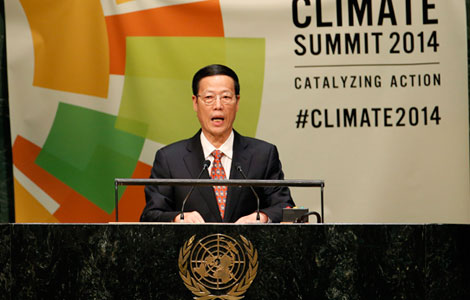
 China to announce post-2020 climate actions asap
China to announce post-2020 climate actions asap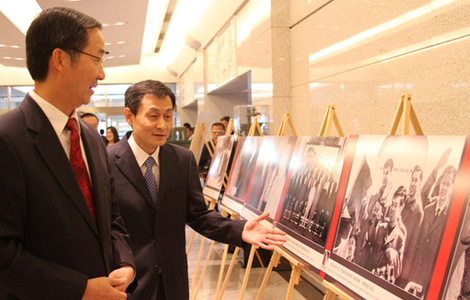
 Reviewing history
Reviewing history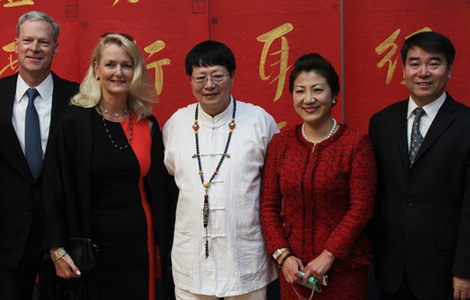
 Chinese calligrapher honored in NYC
Chinese calligrapher honored in NYC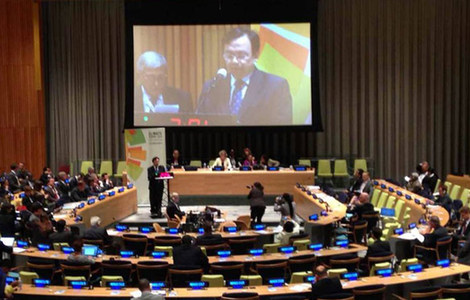
 BYD promotes green buses at UN
BYD promotes green buses at UN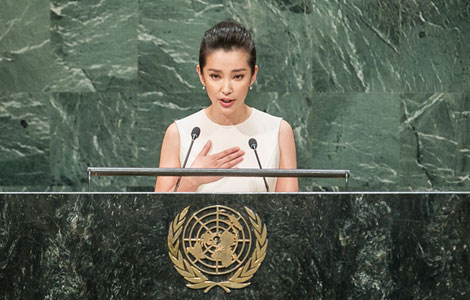
 UN Climate Summit opens with call for action
UN Climate Summit opens with call for action
 Groups unite to help Chinese orphanages
Groups unite to help Chinese orphanages
Most Viewed
Editor's Picks

|

|

|

|

|

|
Today's Top News
Obama urges further coalition efforts against IS
Ex-Chinese planning official on trial for graft
Alibaba's shares down for second day
Emissions report tells only part of story, expert says
Xi reassures HK on stability issue
Obama, Zhang meet at UN
China reaffirms resolve to fight climate change
VP calls for stronger China-EU climate cooperation
US Weekly

|

|







